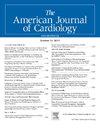糖尿病对分叉经皮冠状动脉介入治疗的影响:PROGRESS-BIFURCATION 登记的启示。
IF 2.1
3区 医学
Q2 CARDIAC & CARDIOVASCULAR SYSTEMS
引用次数: 0
摘要
糖尿病(DM)对分叉经皮冠状动脉介入治疗(PCI)疗效的影响研究有限。我们比较了 2013-2024 年间在五个中心进行的 1302 例二叉口 PCI(1147 例患者)中有糖尿病和无糖尿病患者的手术特征和疗效。糖尿病患病率为33.8%(n=388)。糖尿病患者更年轻,心血管风险因素更多,血管造影复杂性更高,包括主血管钙化更多,左主干、左前降支近端和右冠状动脉狭窄更常见。技术成功率(95.5% vs 94.9%,p = 0.613)和手术成功率(90.2% vs 91.3%,p = 0.540)没有差异;糖尿病患者使用临时支架的比例较低(64.5% vs 71.1%,p = 0.015)。糖尿病患者重复院内PCI和急性肾损伤的发生率较高。调整混杂因素后,其他院内结果相似。在中位 1095 天的随访中,糖尿病与较高的主要不良心血管事件发生率密切相关(危险比 [HR]:2.04,95% 置信区间 [CI]:1.52, 2.72, 1.52, 2.72):1.52,2.72,p < 0.001)、心肌梗死(HR:1.94,95% CI:1.05,3.25,p = 0.033)、死亡(HR:2.26,95% CI:1.46,3.51,p < 0.001)、靶(HR:1.6,95% CI:1.01,2.66,p = 0.045)和非靶(HR:2.00,CI:1.06,3.78,p = 0.032)血管再通。与非糖尿病患者相比,接受分叉PCI的糖尿病患者在院内重复PCI和随访期间发生主要不良心脏事件的风险更高。糖尿病(DM)会增加冠状动脉疾病(CAD)的风险,并与冠状动脉病变更加复杂和多灶化有关(1,2)。在一些(3)但并非所有(4,5)研究中,糖尿病患者经皮冠状动脉介入治疗(PCI)与短期和长期不良事件的高发生率有关。在 Xue 等人的一项研究中,与非糖尿病患者相比,接受 PCI 治疗的新诊断和既往已知糖尿病患者的随访主要心脏不良事件(MACE)发生率更高(6)。分叉病变占所有 PCI 手术的 15-20%,手术难度很大(7-9)。二叉口 PCI 与较低的技术和手术成功率(10)和较高的不良预后(11,12)有关。虽然有关于糖尿病对 PCI 患者影响的公开数据(13),但关于糖尿病对分叉 PCI 影响的数据却很有限(表 1)。我们在一项多中心登记中研究了糖尿病对分叉口 PCI 治疗效果的影响。本文章由计算机程序翻译,如有差异,请以英文原文为准。
Impact of Diabetes Mellitus on Bifurcation Percutaneous Coronary Intervention: Insights from the Prospective Global Registry for the Study of Bifurcation Lesion Interventions Registry
The impact of diabetes mellitus (DM) on the outcomes of bifurcation percutaneous coronary intervention (PCI) has received limited study. We compared the procedural characteristics and outcomes of patients with and without DM in 1,302 bifurcation PCIs (1,147 patients) performed at 5 centers between 2013 and 2024. The prevalence of DM was 33.8% (n = 388). Patients with diabetes were younger and had more cardiovascular risk factors and greater angiographic complexity, including more main vessel calcification and more frequent stenoses in the left main, proximal left anterior descending, and right coronary artery. There was no difference in technical (95.5% vs 94.9%, p = 0.613) or procedural success (90.2% vs 91.3%, p = 0.540); provisional stenting was used less frequently in patients with diabetes (64.5% vs 71.1%, p = 0.015). Patients with diabetes had higher rates of repeat in-hospital PCI and acute kidney injury. Other in-hospital outcomes were similar after adjusting for confounders. During a median follow-up of 1,095 days, diabetes was independently associated with greater incidence of major adverse cardiovascular events (hazard ratio [HR] 2.04, 95% confidence intervals [CI] 1.52 to 2.72, p <0.001), myocardial infarction (HR 1.94, 95% CI 1.05 to 3.25, p = 0.033), death (HR 2.26, 95% CI 1.46 to 3.51, p <0.001), and target (HR 1.6, 95% CI 1.01 to 2.66, p = 0.045) and nontarget (HR 2.00, CI 1.06 to 3.78, p = 0.032) vessel revascularization. Patients with DM who underwent bifurcation PCI had greater risk of in-hospital repeat-PCI and major adverse cardiac events during follow-up than did those without diabetes.
求助全文
通过发布文献求助,成功后即可免费获取论文全文。
去求助
来源期刊

American Journal of Cardiology
医学-心血管系统
CiteScore
4.00
自引率
3.60%
发文量
698
审稿时长
33 days
期刊介绍:
Published 24 times a year, The American Journal of Cardiology® is an independent journal designed for cardiovascular disease specialists and internists with a subspecialty in cardiology throughout the world. AJC is an independent, scientific, peer-reviewed journal of original articles that focus on the practical, clinical approach to the diagnosis and treatment of cardiovascular disease. AJC has one of the fastest acceptance to publication times in Cardiology. Features report on systemic hypertension, methodology, drugs, pacing, arrhythmia, preventive cardiology, congestive heart failure, valvular heart disease, congenital heart disease, and cardiomyopathy. Also included are editorials, readers'' comments, and symposia.
 求助内容:
求助内容: 应助结果提醒方式:
应助结果提醒方式:


